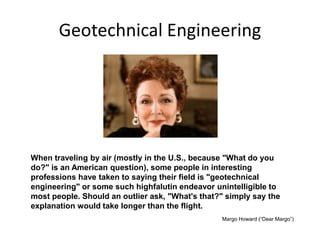An Unbiased View of Geotheta
An Unbiased View of Geotheta
Blog Article
5 Simple Techniques For Geotheta
Table of ContentsThe Only Guide for GeothetaExamine This Report about Geotheta6 Simple Techniques For GeothetaUnknown Facts About GeothetaThe Only Guide to Geotheta

They carry out website investigations, collect samples, execute research laboratory examinations, and examine information to review the suitability of the ground for construction projects - Engineer of Record. Based upon their findings, geotechnical engineers supply recommendations for structure layout, incline stability, preserving structures, and reduction of geotechnical hazards. They team up with various other experts, such as engineers, structural engineers, and building teams, to make certain that geotechnical considerations are incorporated into the overall project layout and implementation
By evaluating the habits and residential or commercial properties of soil and rock, they can determine prospective geotechnical threats such as landslides, dirt negotiation, or incline instability. Their know-how assists prevent failings or accidents that can jeopardize lives and residential or commercial property. Below are some comprehensive obligations and responsibilities of a geotechnical designer: Website Examination: Geotechnical designers conduct website investigations to collect information on subsurface conditions.
They analyze the information to comprehend the homes and actions of the soil and rock, including their stamina, leaks in the structure, compaction attributes, and groundwater conditions. Geotechnical Analysis and Style: Geotechnical engineers examine the data accumulated during site examinations to evaluate the security and suitability of the website for building tasks. They do geotechnical computations and modeling to examine aspects such as bearing ability, settlement, incline stability, lateral earth stress, and groundwater flow.
Geotheta - Truths
Foundation Design: Geotechnical designers play an essential duty in making foundations that can safely sustain the designated framework. They evaluate the dirt problems and load demands to determine the proper structure type, such as superficial foundations (e.g., footings), deep structures (e.g (https://www.find-us-here.com/businesses/Geotheta-Alexandria-Alabama-USA/34113488/)., heaps), or specialized techniques like dirt improvement. They think about aspects such as settlement limits, bearing capability, and soil-structure communication to establish ideal structure designs
They evaluate construction strategies, monitor website tasks, and perform area assessments to verify that the style recommendations are complied with. If unexpected geotechnical concerns occur, they evaluate the scenario and provide recommendations for removal or adjustments to the style. Danger Analysis and Reduction: Geotechnical engineers analyze geotechnical risks and threats linked with the task site, such as landslides, liquefaction, or dirt disintegration.

Collaboration and Interaction: Geotechnical engineers work very closely with other professionals included in a task, such as engineers, structural designers, and building teams. Effective communication and collaboration are important to incorporate geotechnical considerations into the total job design and building and construction process. Geotechnical designers offer technical know-how, answer queries, and make sure that geotechnical requirements are met.
10 Simple Techniques For Geotheta
Right here are some kinds of geotechnical designers: Foundation Designer: Foundation engineers focus on designing and analyzing foundations for structures. They evaluate the dirt problems, lots requirements, and site characteristics to figure out one of the most suitable structure kind and design, such as superficial foundations, deep foundations, or specialized methods like stack structures.
They assess the factors influencing incline stability, such as dirt properties, groundwater conditions, and slope geometry, and establish strategies to protect against incline failures and reduce threats. Quake Engineer: Quake designers concentrate on analyzing and creating structures to stand up to seismic pressures. They evaluate the seismic hazard of a website, examine dirt liquefaction possibility, and develop seismic layout requirements to ensure the security and strength of structures during quakes.
They execute field testing, collect samples, and assess the gathered data to characterize the soil residential or commercial properties, geologic formations, and groundwater problems at a website. Geotechnical Instrumentation Designer: Geotechnical instrumentation engineers concentrate on tracking and gauging the behavior of dirt, rock, and frameworks. They mount and keep instrumentation systems that check variables such as dirt settlement, groundwater degrees, slope movements, and structural variations to examine performance and provide early warnings of possible issues.
How Geotheta can Save You Time, Stress, and Money.
They conduct examinations such as triaxial tests, consolidation examinations, straight shear tests, and permeability tests to collect data for geotechnical evaluation and design. Geosynthetics Engineer: Geosynthetics designers focus on the style and application of geosynthetic products, such as geotextiles, geogrids, and geomembranes. They make use of these materials to enhance dirt security, reinforce inclines, provide drain solutions, and control erosion.
They often tend to be investigatory people, which means they're intellectual, introspective, and curious. They are curious, methodical, reasonable, analytical, and logical. Some of them are likewise social, meaning they're kind, charitable, participating, patient, caring, valuable, understanding, tactful, and pleasant - Geo Tech Engineer.
In the office atmosphere, geotechnical designers make use of specialized software program devices to do computations, develop styles, and analyze data. They prepare reports, testimonial task specifications, connect with customers and employee, and coordinate project activities. The workplace setup supplies a favorable environment for research study, evaluation, and collaboration with various other specialists associated with the job.
The 10-Minute Rule for Geotheta
They often visit job sites to perform website investigations, assess geotechnical problems, and gather information for evaluation. These gos to involve traveling to various areas, in some cases in remote or difficult surfaces. Geotechnical designers may do dirt tasting, conduct examinations, and screen construction activities to guarantee that the geotechnical aspects of the job are being executed correctly.
Geotechnical designers also function in specialized geotechnical laboratories. Geotechnical research laboratory designers function thoroughly in these settings, managing screening devices, operating instruments, and videotaping information.
Report this page